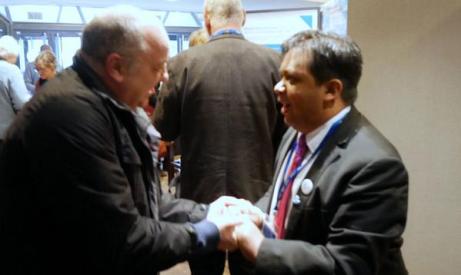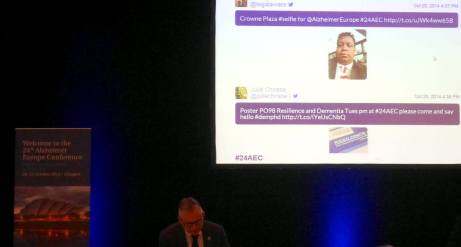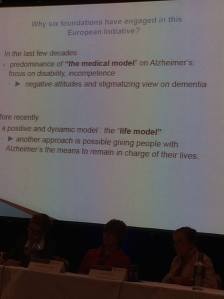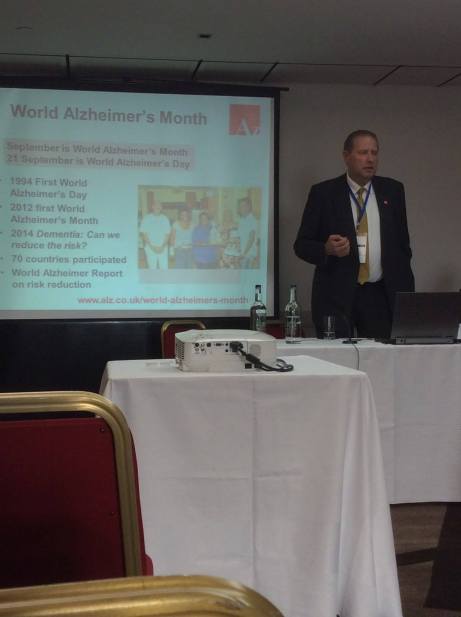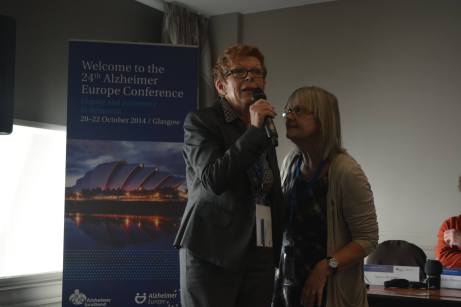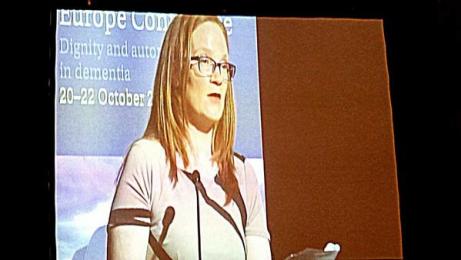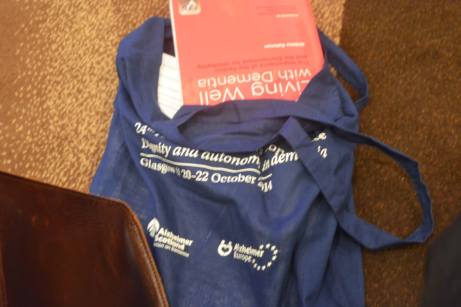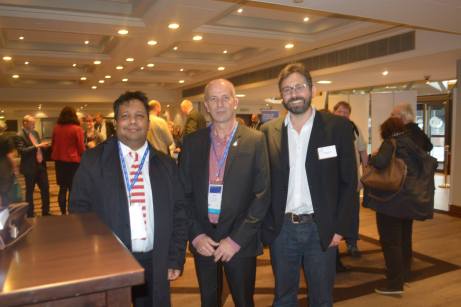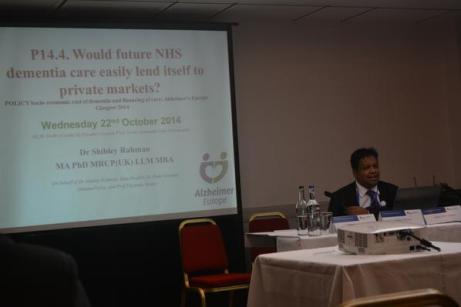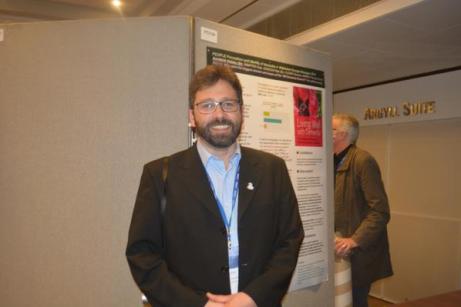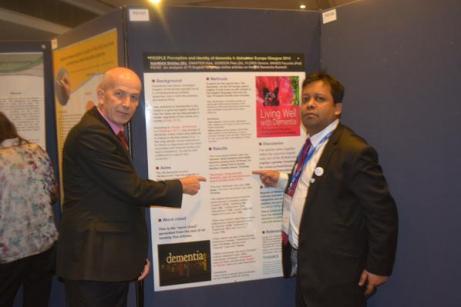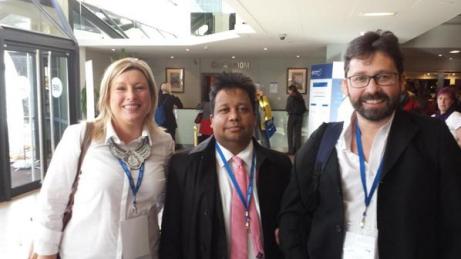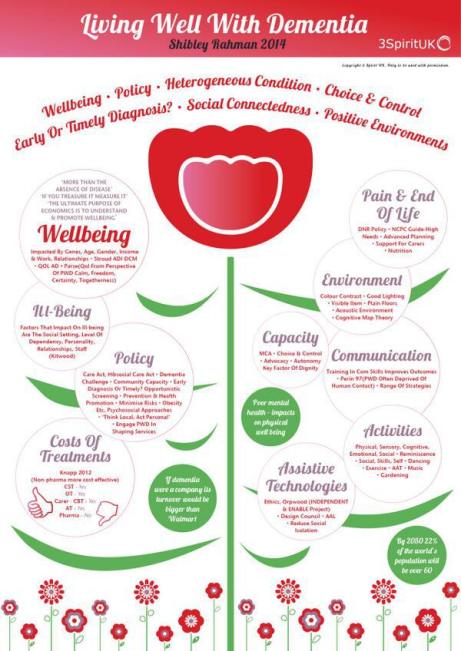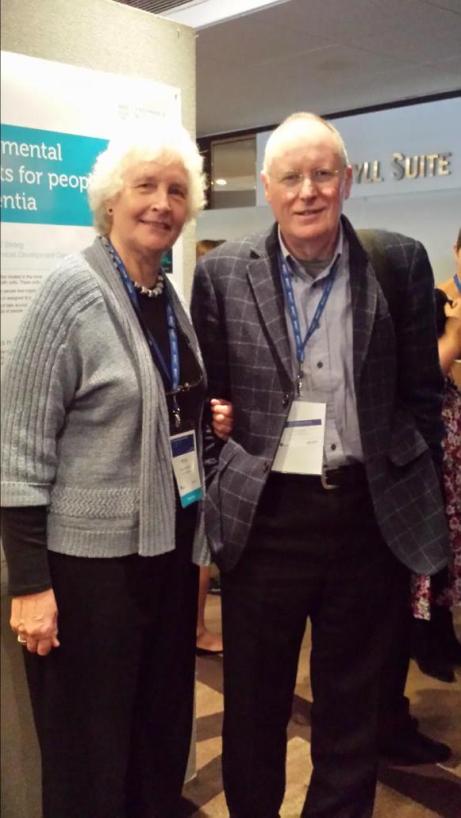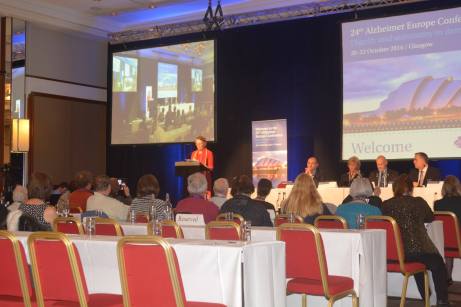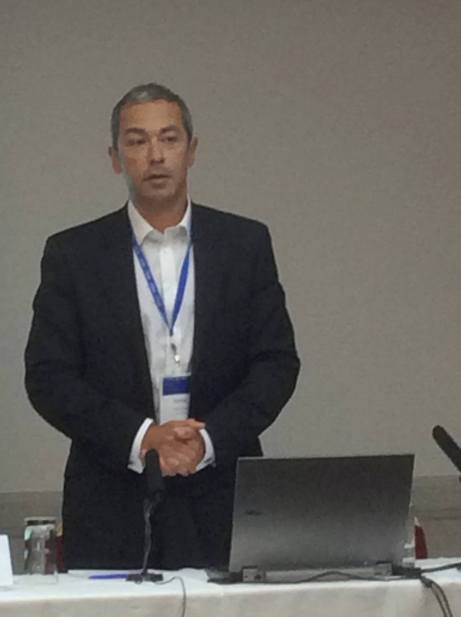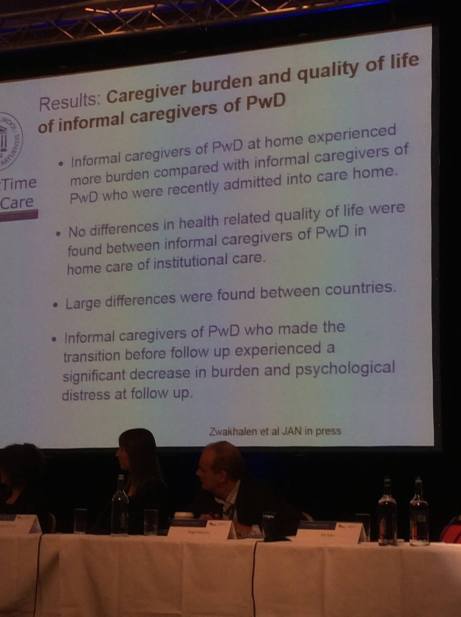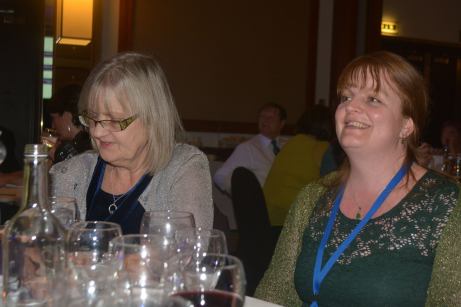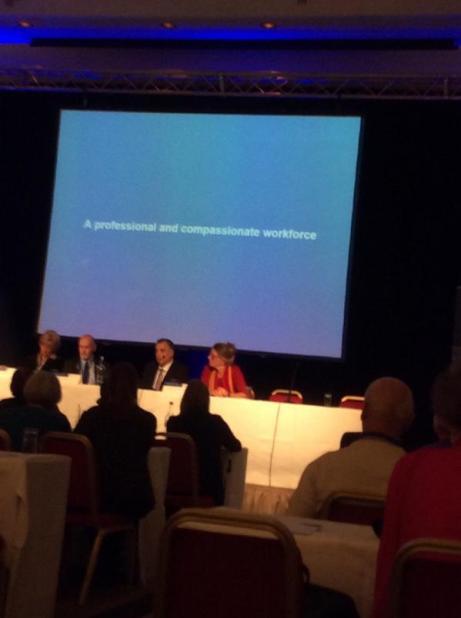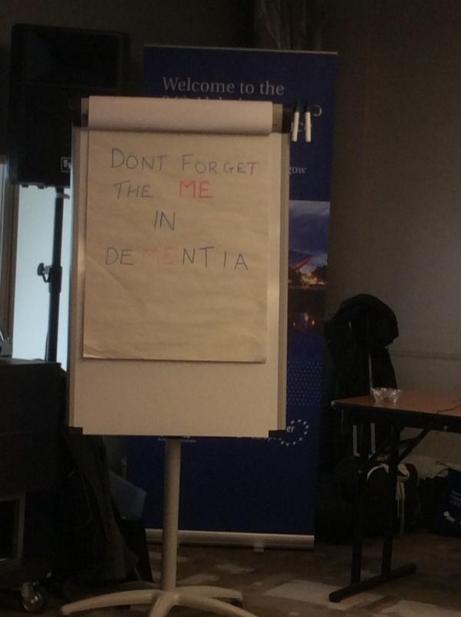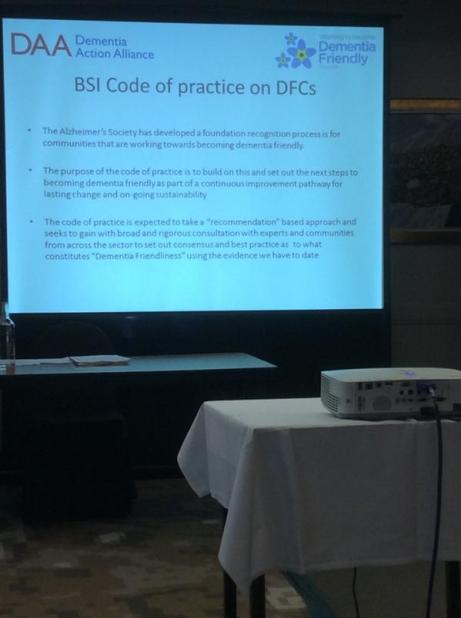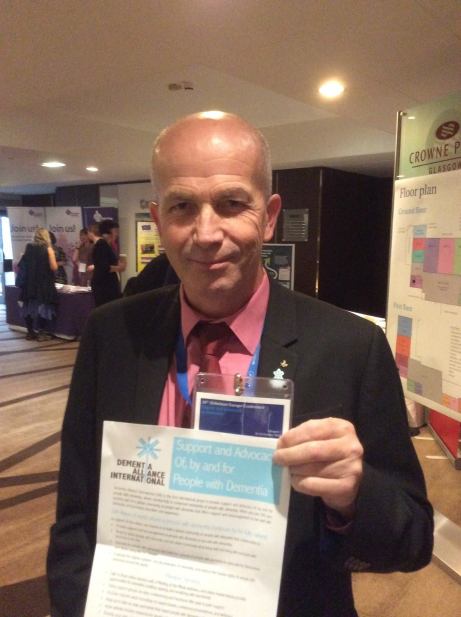Home » Posts tagged 'conference'
Tag Archives: conference
Jeremy Corbyn and the whole of Labour has become the ultimate nightmare for the Tories
As Emily Thornberry said this morning, “There is nothing stronger than a person of principle…. Thanks to Jeremy Corbyn’s inspirational leadership, and the efforts of all the people in this room, it’s time to put Labour values back into government.” Everything has now in fact changed. This is not merely because the Conservative party, and their bullshit such as £350 million re-invested in the NHS, is a ‘busted flush’. It’s much more than that. I first went to the Labour party conference in 2010 in Manchester. It was in fact a few months before my father was to die. I remember my time there crystal clearly. I remember meeting John Prescott for the first (and only) time in a curry restaurant in the Curry Mile, and various people who were both very young and very energised about being in the Labour movement. David Prescott kindly helped me across the street, avoiding being run over by the trams. I had become newly physically disabled at the time, due to meningitis. In fact, I remember going to a fringe event at breakfast time in Manchester Town Hall on the subject of how to engage ‘missing voters’. Ellie Mae O’Hagan was there. Some brilliant contributions from Matt Zarb Cousin stuck in my mind. I wonder what happened to him.
At the time, I was in the ‘top ten’ Labour blogs. But now is much better. I think this Labour conference in 2017 in Brighton is full of optimism and hope. Labour for the first time in ages, I feel, has a realistic chance of being the party of government. I think we very mostly agree Jeremy Corbyn has turned ‘pro’. He batted away questions on striking from Andrew Marr with amazing ease yesterday morning. The hacks have made it an open secret that they have no conflict to discuss. The observation that Brexit is not one of the motions for debate is the only thing that desperate hacks can cling onto, but you only have to look at the list which has emerged – which includes the NHS, social care, growth and investment and employment issues – to see that there is no existential crisis in the Labour Party. Not at all. It is a party which is prepared to govern for the many, not the few.
The Tories’ economic model of delivering shareholder dividend with rocketing prices, suppressed wages with inflated cost of living, is not appealing to the vast majority. The ‘work til you drop’ approach is terrifying. The way in which disabled citizens have lost their personal independence payment is nothing short of the ultimate in unacceptable morally. Corrupt capitalism has had its day. Grenfell paid testament to that. Outside of the hall, it is very clear that many delegates have been speaking to some of ‘the many’. There has been a strong sense from speakers from the floor to speak out about issues of social justice, in the quest for equalities and fairness. There has been reference to homeless people, which Tony Benn famously used to congratulate market forces for. There has been a clear drive to reset the narrative to appreciate and value migrants and asylum seekers. The Momentum festival has been well received. There is no sense that Polly Toynbee needs to visit it to provide it with external validation. Trade unions defend public services, campaign to prevent abuses of workers and employees, and are no longer a ‘dirty word’.
I voted for Jeremy Corbyn twice as leader of the Labour Party, and, like many, it is tempting not to forget so easily the time which has been wasted in setting out the case for Corbyn again and again and again, the carping and criticism from 170 or so Labour MPs, or the whingeing from senior people in the Labour Party keen to ‘blame’ Corbyn for Brexit. Nor is it quite so easy to forgive and forget the amount of time, effort and money taken by the NEC to stop people voting for Corbyn as leader out of fear that all the new members of Labour were Marxist throwbacks from the 1980s. But the surge in membership of the Labour Party is entirely genuine, making Labour a massive democratic party. This is an especially amazing achievement, given the context of how parties such as ‘Alternative for Deutschland’ with an anti-Muslim and anti-migrant, far right, agenda have garnered support to fill the ‘political space’. True that the Labour Party is not entirely a socialist party, although it has socialists in it. But it is also true that there are many more people are loud and proud to be associated with the socialist ideals and values which have been promoted by the current leadership of the Labour Party.
Whilst the ‘we want a Jobs first Brexit’ is in danger of being a vacuous phrase, there’s no doubt about the dependence of certain sectors, not least the NHS and social care, on EU citizens living in Britain. If it turns out that the Conservatives are simply unable to negotiate a meaningful settlement with the European Union within two years, it is quite possible that the Labour Party will have to do something drastic about deciding upon a post-Brexit future. Jeremy Corbyn openly explained on #Marr yesterday that it was possible that state aid rules had not made it possible to intervene in industries as he would have liked, and actually had helped to privatise certain industries such as rail. It wasn’t that long ago, after all, that there had been concerns about how TTIP might stitch up a trade deal with the US over the NHS, but now the threat to the NHS from Donald Trump and Jeremy Hunt is far greater. Free movement of workers has had problems also with employees, particularly of multi-national corporates, effectively leading to wage suppression, but this fundamentally was always a problem presented by employers. But Labour is well aware that the UK economy could easily tank on Brexit especially on leaving membership of the signatories to the rules of the “single market” or “customs union”, and the devaluation of the pound sterling and exodus of jobs abroad are both already alarming. But if you think to choose who you want driving the car – Boris Johnson, David Davis and Priti Patel or Sir Keir Starmer, I know who I prefer.
Members of the media have consistently been spitting bullets at Corbyn. James O’Brien on LBC spent substantial daily effort into rubbishing Corbyn. The 2017 Labour manifesto was a massive triumph, propelling Labour to its largest vote this century. The Tories claim they even put Jeremy Corbyn on the ballot paper the first time around. Various people sneered at the rallies held by Corbyn across the country, claiming simultaneously that Corbyn had a ‘bunker mentality’ which prevented him from meeting the general public, and saying that there was no such social movement. But it is clear that there is something material and significant happening under the RADAR, as Jess Phillips, Clive Lewis and Laura Pidcock are treated like rock stars rather than members of parliament. Paul Mason, I remember, was often criticised for claiming that “strong and stable” Theresa May would not be returned with a stonking majority, and Paul Mason’s views and opinions, for example, on topics ranging from tuition fees to bellicose nuclear speak from Donald Trump are taken with considerably more gravitas than other commentators. The whole team are pretty awesome now, including Barry Gardiner who is prepared to call out people talking nonsensical crap.
Gains such as Canterbury and London Kensington and Chelsea have been amazing. Amber Rudd’s seat in Hastings is now up for grabs. Nobody can fault how amazing Andy Gwynne has been. Of course, much blood has been spilt and this is to be expected from a broad coalition of sorts. I no longer speak to the Socialist Health Association because of their open support for marketization of the NHS, PFI and Owen Smith. Tom Watson is no longer on Len McCluskey’s Christmas card list. I think critics within Labour have really got the work cut out if they wish not to help Jeremy Corbyn and the Labour party prepare for government. You can tell from the reception to the limp interventions from Ben Bradshaw and Heidi Alexander over the single market that they are not the future now. But supporters of Labour fundamentally know that they did not introduce austerity. Vince Cable, on the other hand, did. The Liberal Democrats cannot be absolved from their blame on the bedroom tax, either. The Fabians, with their star turns, are having trouble trying to reverse the deluge of criticism they have doshed out to Corbyn and colleagues. The Twitter community, with Chunky, Rachael, Steve, Matt, Tom, Peter, Liam, “Scouse Girl”, EL4JC, Michael, WowPetition, Éoin, Matt, Ellie, or Paul, of course going from strength to strength. Labour’s policies speak to the concerns of the many not the few – such as personal debt, only today, being worked up by John McDonnell and Rebecca Long-Bailey. I agree with Jeremy Corbyn that he will need at least two terms of government to get the UK back on course, but there is a real sense of energy, positivity, drive and optimism which means that Labour and its social movement deserve every success.
The 24th Annual Conference for Alzheimer Europe put people with dementia in the driving seat. Deservedly so.
The biggest dementia conference to be taken place in Scotland (“Conference”, attended by 800 professionals, people with dementia and carers) was held in Glasgow last week (20-23 October 2014).
The focus of the conference was Dignity and autonomy in Dementia and the four day event explored in quite some detail how recognising the human rights of people with dementia, their carers, partners and families is key to ensuring dignity and respect, as well as overcoming stigma.
It was the 24th Annual Conference of Alzheimer Europe (@AlzheimerEurope, an umbrella organisation of 36 Alzheimer associations from 31 countries across Europe), supported this year by Alzheimer Scotland, .
The timetable was exacting.
The people there were very special; for example Tommy Whitelaw (@TommyNTour) mentioned in Alex Neil MSP’s speech at the conference. Tommy and Irene Oldfather (@IreneOldfather) happened to be passing through during one of my poster sessions.
And Beth Britton (@BethyB1886).
Well done to the conference organisers for putting it together, especially Gladwys Guillory.
The main conference hall of the venue, the Crowne Plaza in Glasgow, the Argyll Suite, was majestic.
I particularly liked the ‘live Twitter feed’ at the front of the hall, where curiously Kate Swaffer (@KateSwaffer) appeared many times all the way from Australia. Here I am appearing with my ‘selfie’, with somebody well known in the foreground of the photograph.
The relative failure of the medical model in addressing the needs of people with dementia and caregivers was a pervasive theme throughout the whole conference.
I had a nice chat with Marc Wortmann (@marcwort) over one of the lunches. Marc is in charge of all aspects of ADI’s work (ADI = Alzheimer Disease (and associated conditions) International; @AlzDisInt). Collaborating with the Board, Marc implements finance and campaign strategies.
Marc represents ADI at international conferences and in the NCD Alliance and takes part in WHO and UN meetings. I was also able to bump into Jean Georges (@JeanGeorgesAE), the Executive Director of Alzheimer Europe.
Cabinet Secretary for Health, Alex Neil, delivered a clear keynote speech to the conference at the Tuesday morning plenary session, in which he paid tribute to the immense contribution of Tommy Whitelaw.
Key to the event was the signing of the Glasgow Declaration: a commitment to promoting the rights, dignity and autonomy of people living with dementia across Europe, as guaranteed in the European Convention of Human Rights and the Universal Declaration of Human Rights.
Here’s a great slide of @alzscot‘s “PANEL” (pic taken by @LauraMcC86).
The satellite symposium sessions were well put together, and attracted substantial audiences.
There was an amazing moment when Agnes Houston (@Agnes_Houston), Chair Scottish Dementia Working Group, said to Helga Rohra (@ContactHelga), the Chair of the satellite session and Chair of European Persons With Dementia, “All we people with dementia need is a bit of help — AND A BIT OF TIME!”
A quotation from Agnes – from a previous conference – says it all for me.
The audience burst out laughing.
The reason for this is that Agnes had been originally timetabled to have more time for her slot, apparently.
As the conference was themed around the law, including human rights, invariably discrimination against people with dementia came up in various forms.
I asked about the topic several times.
One talk of the entire programme which I thought was truly outstanding was PL1.3. Gráinne McGettrick (Alzheimer’s Society of Ireland): The UN Disability Convention as an instrument for people with dementia and their carers.
In the English jurisdiction, dementia can count as a disability; therefore there are statutory requirements for ensuring dementia-friendly communities from employers. Also, unfair dismissal of a person on account of being newly diagnosed with dementia will clearly be unlawful.
A member of the audience politely pointed out to me afterwards that a person normally gets sacked first, and then gets his or her diagnosis of dementia confirmed much later, so at the point of dismissal the dismissal does not obviously appear unfair legally.
I found this observation incredibly insightful, as there have been thus far no ‘test cases’ of unfair dismissal on grounds of a diagnosis of dementia in the English jurisdiction.
I had brought along my book ‘Living well with dementia’, but I rarely got a chance to read (or refer) to it during the course of the whole week!
I asked several times why there is no representative of persons living with dementia or caregivers on the World Dementia Council (@WorldDementia). The background to this fiasco is explained here.
I had designed that I would be staying in the same competitively-priced hôtel as Jayne Goodrick (@JayneGoodrick) and Chris Roberts in Glasgow for the 24th Alzheimer Europe conference held in Glasgow, the city where I was born.
It was by chance we gave a lift to Dr Ruth Bartlett (@RuthLBartlett) to the conference venue. Ruth was staying, as it turns out, in the same competitively-priced hôtel.
Ruth is of course well known for her well respected contributions about the citizenship of of people living with dementia, and how this has influenced the ‘involvement’ of people with dementia in policy.
This was us just before the opening ceremony – when we were full of energy.
I really enjoyed speaking with Geoff Huggins (@GeoffHuggins), who gave an excellent speech in the opening ceremony.
I presented my talk on how dementia healthcare would not be best served by a private insurance system, because of the potential problems of ‘moral hazard’ and genetic discrimination.
This talk was, overall, well received.
I was particularly pleased with the wide-ranging, excellent discussion we had after my talk. Thanks especially to Amy Dalyrymple (@Amy_Dalyrymple), Head of Policy for Alzheimer Scotland, whose contributions in all areas of policy were particularly interesting. The work currently being implemented in Scotland represents a culmination of very high quality inclusive work through a number of different stakeholders.
I was also honoured to present two further research posters, which I had co-authored on the perception and identity of the G8 conference.
And here’s co-author Dr Peter Gordon (@PeterDLROW) proudly in front of our poster too!
Chris Roberts (@mason4233) helped me with the poster session. It was in fact Chris who identified that the phrase “living well with dementia” was not used even once in the top 75 web articles on #G8dementia on Google, in about 44000 words odd.
All around the conference were people whose work is directly relevant to my book: for example Silke Kammer – on the arts and music – and Emma Killick (@RealEmmaKillick) who at the excellent MacIntyre leads on children and adults with learning disabilities and/or autism, but is clearly passionate about people with learning disabilities who later have further unaddressed needs on receiving a diagnosis of dementia.
It was terrific to bump into followers everywhere I went. It was great to meet Julie Christie (@juliechristie1) for the first time, whose work on resilience I am much interested in. It was also lovely to see Anna Tatton (@annatatton1) doing so well.
I am well aware of why the Scottish dementia nursing strategy, some say, has become the ‘envy of the world’. It was a huge privilege to meet in person Janice McAlister (@JaniceMcAlister), who was BJN Nurse of the Year Elderly Care 2013. In addition, I found the presentation by Hugh Masters (@HughCMasters), Associate Chief Nursing Officer for the Scottish Government, interesting for insights as to how England might improve its service too.
I happened to meet in the foyer of the Crowne Plaza on Monday night Ann Pascoe, @A_Carers_Voice, somebody who I have not only liked a lot on Twitter, but whose work on rural ‘dementia-friendly communities’ I have massively respected for some time.
Likewise, it was really nice to catch up with Caroline Bartle (@3SpiritUKNZ), who very kindly once did an infographic of my book ‘Living well with dementia’.
I met in the poster session Prof Mary Marshall to whom the Stirling School in design in dementia owes a huge amount. I owe a huge amount to Prof Marshall too, as the Notting Hill masterclass which I once attended got me first interested in this subject a few years ago (I had a long chat with Prof Marshall there.)
There were not idle tokenistic sops to people living with dementia, and their closest ones, in the whole conference. They were at all times integral to the fabric of the conference.
For example, the seating arrangements in the main Argyll conference suite reflected the special respect given to people with dementia and those closest to them.
The substance of the conference for the most part was of an exceptionally high standard in policy; there was next to no shilling of commercial projects.
The work from Alzheimer Scotland (@alzscot), including, predictably, the work focused on autonomy and dignity, and human rights, was showcased in an impressive way. Their work hangs together as a coherent, forceful narrative of meaningful significance for the Scottish jurisdiction.
It also has clear implications for how England conducts itself south of the border, notably, for example, in a right to timely diagnosis, and a right to timely care and support (including proper coordination of care and support).
In common with Scotland, England is trying to tackle hard the inappropriate use of antipsychotics. Dr Karim Saad (@KarimS3D) gave an excellent talk on this subject, drawing on recent findings from the ALCOVE2 study.
Scotland, in fairness, seems to be having less trouble with its policy than England is.
There was a very good sprinkling of cutting-edge research relevant to all practitioners in the field.
For me, the conference had the feeling of a happy wedding without any of the arguments.
Here are Agnes and Donna.
Whilst originally ‘unkeen’, I ended up having a wonderful time at the “Gala Dinner”. The entertainment – traditional Scottish music and dance – was amazing.
I was able to chat with Agnes and Nancy for some time. What a joy.
Elaine Hunter (@ElaineAHPmh) gave an excellent presentation on the transformative changes which had happened around the workforce in Scotland, including leadership from allied health professionals.
Without doubt, a skilled workforce for the provision of dementia services is essential, not gimmicks.
I consider Helga to be a true friend too. Meeting Helga was akin to being wowed by Lady Gaga.
I had last felt like this when I met Norman McNamara (@norrms) at the Queen Elizabeth II centre in London, Westminster.
I learnt a lot from the all-day workshop on building dementia friendly communities.
Over lunchtime, Joy Watson gave a brilliant ‘Dementia Friends’ (@DementiaFriends) session. I, in fact, was total awe as I am also a ‘Dementia Friends Champion’, and discovered many tips how to run my sessions in future!
This is a brilliant film exhibiting the passion which Joy puts into her Dementia Friends sessions.
Karishma Chandaria (@Karishma1000) chaired this exceptional day’s workshop, called a ‘masterclass’ on dementia friendly communities, which indeed mentioned the code of best practice for dementia friendly communities currently under consultation.
Chris Roberts made time to hand out flyers for membership of the ‘Dementia Alliance International‘, an unique campaigning group run wholly by people living with dementia.
This Conference mapped topics clearly onto people living with dementia and caregivers, for which the organisers of this event must be heavily congratulated.
Next year’s Conference will be in Slovenia. I’ll be there! Bring it on!
Jeremy Hunt’s final speech to the Conservative Party conference on the NHS
This is the text of the speech given by Mr Jeremy Hunt, the Minister who oversees the running of the NHS and care despite having no legal statutory duty for it.
Today I am here to tell the British people that a future Conservative government will have no greater priority than to protect, support and invest in our NHS.
In 1948, the greatest of all Conservatives Winston Churchill supported the then Labour government in its plan to set up a National Health Service. He said ‘disease must be attacked whether it occurs in the poorest or richest man or woman simply on the grounds that it is the enemy.’
That safety net Churchill wanted is our NHS today, supported across the political spectrum.
Last week Labour tried to paint a different picture. They know this government increased the NHS budget despite the financial mess Labour left behind. They know the NHS has more doctors and more nurses than ever before. They know fewer people than ever are waiting long periods for their operations. They know the culture is becoming more caring. But they still seek to trick the public into thinking one party cares for the NHS and the other doesn’t.
Well I have a message for Mr Miliband. It’s not a Labour Health Service or a Conservative Health Service…it is a National Health Service. And when my father was cared for by a district nurse or my wife had our baby this summer or our son goes for his jabs, they aren’t Conservative patients, Labour patients or LibDem patients, they’re NHS patients. When people in this hall volunteer to support the local league of friends or join the board of a hospital we’re not Conservative supporters – we’re NHS supporters. We all support the NHS because the NHS is there for us all.
So don’t turn the National Health Service into a National Political Football and don’t use the NHS to divide us when it’s the fabric that unites our nation.
This morning the Prime Minister announced plans to make it easier for millions of people to get 8 till 8 and weekend appointments with their GPs.
And I want to start today by celebrating that and some of the other successes of our NHS, doing so well despite huge pressure.
Take cancer, our biggest killer. Every family in the country has lost a friend or loved-one to cancer – I lost my own father last year. It is a ruthlessly indiscriminate killer – whether it targets someone who has just retired after a life of hard work or a child with a life stretching out in front of them.
In 2010 this country had amongst the lowest cancer survival rates in Western Europe. So we set up the cancer drugs fund. We’ve transformed cancer diagnosis so the NHS now tests 1000 more people for cancer every single day. And so far this parliament we have treated nearly three quarters of a million more people for cancer than the last one – that’s thousands of lives saved, thousands of families kept together, thousands of tragedies averted. So let’s hear it for our brilliant cancer doctors and nurses.
Or look at dementia, one of the most terrifying conditions of all.
I’ll never forget the courage of man I met with dementia who single handedly stood up to the banks and demanded they gave him an alternative to having to remember a pin number. But it isn’t just your pin number that goes. It’s precious family memories, marriages of many years, relationships with children – all snatched away by cruel tricks of the mind. When we came to office fewer than half of those with dementia got a diagnosis, meaning many missed out on vital medicine or support for their family. We’ve now diagnosed an extra 80,000 people. The Prime Minister hosted a G8 summit to get the drug companies to do more to find a cure. And we’re working with the Alzheimers Society to enroll one million dementia friends to tackle stigma – with half a million signed up so far.
So let’s hear it for GPs, dementia nurses, dementia carers, dementia friends and people with dementia who are changing the way our society tackles this horrible condition.
Or A & E, the critical frontline for the NHS. A young A & E doctor told me how she had cried after seeing a 90 year old man say his goodbyes to a 90 year old woman he’d been married to for over 60 years. For her that was just part of the job. And with a million more people using A & E, the pressures on her and her colleagues are immense.
Sometimes, yes, it’s been tough meeting the target. But despite that we have halved the time people wait to be assessed and are treating nearly 2,000 more people every day within the four hour target compared to 2010. So let’s hear it for our brilliant A & E frontline staff now preparing for a challenging winter.
Conference our opponents say the NHS is in decline. But according to the independent Commonwealth Fund under this government the NHS became the top-rated healthcare system in the world. Better than America, better than France, better than Germany, better than Australia. And the way they rose to the challenge of Ebola says it all – with 164 NHS volunteers offering to go and help contain the outbreak in West Africa. So let’s hear it for all NHS doctors, nurses, porters, cleaners, caterers, carers and volunteers. You are the best of British and the pride of our nation.
But that doesn’t mean things are perfect. About the first thing I did as Health Secretary was to read the original Francis report about the terrible things that happened at Mid Staffs Hospital between 2005 and 2009. I was utterly horrified. As Francis made clear, system-wide failings meant these problems weren’t limited to one hospital.
One member of the public wrote to me about what happened somewhere else in a letter that was so shocking I asked to meet her.
She said she visited her late husband in hospital at 5 in the morning and found him naked on a deflated mattress, caked in urine and excrement, and curled in a foetal position with a cold air conditioner blowing directly onto his body. She still has nightmares about that visit. Now that story, thankfully, is far from typical of our NHS.
But I vowed that day that if I did nothing else, I would make sure I returned a culture of compassionate care to every corner of our NHS. Because caring is what the NHS stands for, what every doctor and nurse passionately wants, why the NHS was set up – and what a quagmire of targets, goals and plans too often allowed to be squashed.
Supported by a wonderfully committed ministerial team – Freddie Howe, Norman Lamb, Dan Poulter, Jane Ellison and George Freeman – we’re changing things.
We introduced a tough new inspection regime.
Since then our hospitals have hired over 5,000 more nurses to tackle the scandal of short-staffed wards; 5 hospitals – Basildon, North Lincs, George Eliot, Bucks and East Lancashire – have been put into special measures and been turned round; and patients are saying that they are treated with dignity and respect not just at Mid Staffs but across the NHS the highest numbers ever recorded.
Indeed on Friday of last week the CQC announced the first hospital in the country to get an ‘outstanding’ rating, Frimley Park in Camberley. Chief Executive Andrew Morris is so committed he has been there for 25 years and his son even works there as a porter. Well done to Frimley Park.
Now the problems of poor care highlighted by Robert Francis happened under Labour – so I thought Labour would rush to support me in sorting them out. In fact they did the opposite. They said talking about poor care was ‘running down the NHS.’ They even tried to vote down the law setting up a new Chief Inspector of Hospitals.
I’ll tell you what ‘running down the NHS’ is:
- It’s not learning the lessons when a mother is forced to give birth on a toilet seat, as happened in 2007. Ignored by Labour, being sorted out by us.
- It’s making hospitals Foundation Trusts even when their mortality rates are too high. Brushed aside by Labour, being sorted out by us.
- It’s stopping the CQC telling the truth about blood-stained floors in one hospital. Happened under Labour, stopped by us.
It happened in England before and it’s happening in Labour-run Wales today – so don’t you dare talk to us about running down the NHS.
Because for Labour good headlines about the NHS matter more than bad care for patients – and in our NHS nothing matters more than patients and whilst I am running it nothing ever will.
I simply say this to a Labour Party that still refuses to learn the lessons of Mid Staffs, until you do, you are not fit to run our NHS. And if you won’t put patients first we will – and it will be the Conservative Party that completes Nye Bevan’s vision for an NHS that treats every patient with dignity and respect. We will finish the job.
I could go on with my concerns about the culture Labour left behind in our NHS. But I want to look forward and deal with one of the biggest concerns people have about the NHS which is about funding.
Labour talked about putting in more money last week. But securing the NHS budget isn’t about an extra billion here or there. It’s about funding over £100bn, which is what we spend on the NHS every year. And that needs a strong economy. Because it’s very simple: you can’t fund the NHS if you bankrupt the economy. This parliament we’ve actually increased spending on the NHS by more – in real terms – than Labour promised last week. We’ve done it because of David Cameron’s personal commitment to the NHS and difficult decisions taken by George Osborne.
Other countries followed Labour’s advice. They ducked those decisions. They had no plan – and ended up cutting their health budgets. Italy by 3%, Greece by 14%, Portugal by 17%. I don’t want that to happen here.
So never forget we’ve just had the greatest squeeze on finances in NHS history because a Labour government lost control of our national finances. So to anyone worried about investment in the NHS I say this: a Labour government with reckless economic policies is the biggest single danger to funding our NHS. Do not take that risk. Nor should we forget that every penny of NHS funding comes not from the government but out of the pockets of hard working taxpayers. So if we increase spending on the NHS we must also look every one of them in the eye and promise that every penny is being spent wisely. Which means we mustn’t stop new ideas that come from outside the NHS – whether from charities or, yes, the independent sector.
Labour call this privatisation. But using a charity like WhizzKids to supply wheelchairs to disabled children or using Specsavers to speed up the supply of glasses is not privatisation. When the last Labour government used the independent sector to bring down waiting times that wasn’t privatisation either. So stop scaremongering about privatisation that isn’t happening. It nearly cost us Scotland – and we won’t let it poison the debate in England as well. Secure NHS funding backed by a strong economy is the foundation.
But the building blocks to a modern health service are two things that need real cultural change.
Personal care – a real challenge as patients navigate one of the biggest organisations in the world. And personal control – in a world which has too often said the doctor, not the patient, knows best.
I remember when I did a shift in an A & E last year. A 90 year old lady with dementia was brought in by ambulance after a fall in her care home. She was completely motionless. She couldn’t talk. She couldn’t feed herself or even drink a glass of water. What made it worse was that in that A & E we knew next to nothing about her. We didn’t have her medical record. We didn’t know her allergies. We didn’t know if she was normally able to talk or whether it was just because of the fall. To us at that hospital she was not just unknown. She was anonymous. How could we possibly give her the personal care she desperately needed?
The same could happen to any one of half a million over 90s in our society. And it could happen to anyone with long term or mental health conditions, anyone of whom can find themselves anonymously pushed from pillar to post in a system that doesn’t know who they are. But for me the point of the NHS is to make sure all everyone gets truly personal care from people who know about them, know about their condition, know about their care plan – so that what happened in that A & E never happens again.
As a first step that needs the integration of the health and social care systems. And for the first time ever this year it is happening. 150 local authority areas working together with their local NHS on their Better Care plans to pool commissioning, reduce emergency admissions and share medical records all starting from next April – with many of you in this hall involved.
But truly personal care means more than joining up health and social care. It means personal, responsive care from your GP too.
Last year I manned the phones in a busy London GP practice. The doctors there worked very hard. But what was frustrating was having to tell nearly every caller there were no appointments available for two to three weeks.
We urgently need to make it easier for busy, working people to get an appointment. That means more GPs, so I can today confirm plans to train and retain an extra 5,000 GPs.
But it also means new ways of working. Last year we announced plans for 7.5 million patients to get weekend and 8 till 8 appointments. Today we have also announced we are rolling that out to millions more – meaning this service will be available for a quarter of the whole population. And going even further, I commit that at the end of the next parliament a Conservative government will make sure every NHS patient across the whole country will be able to get weekend and 8 till 8 GP appointments.
But personal care isn’t just about a convenient appointment. It means talking to a doctor who knows about you and your condition.
Astonishingly in 2004 Labour abolished the requirement for every patient to have their own, named, personal GP. At a stroke, many patients were told they no longer had their own GP, but were merely attached to a surgery. And GPs were told they were no longer personally responsible for patients. If you have a chronic condition or complex needs, continuity of care is absolutely vital. You don’t want to have to explain everything about yourself over and over again – and you want a doctor who takes ongoing responsibility for sorting things out – not just that day but every day.
So last year I changed that back for over 75s by insisting they get a GP named on their medical record and responsible for their care. Today I can go further and announce that in the new GP contract for 2015 every single person in England will go back to having a family doctor named on their record and responsible for their care.
Personal care for every NHS patient – delivered by this government. People want personal care. But in the 21st century they want something else. Not just personal care but personal control. People with diabetes, or a heart condition, or recovering from a stroke say the best person to take control of your care is not actually your doctor – it’s you. And right now we make that far too hard. We don’t give people enough information.
So this summer we became the first country in the world to publish detailed information about safety, waiting times, patient experience and food for every major hospital. And on the new MyNHS website we’ll go further.
But it isn’t just information about your local hospital you want, it’s information about you. So today I can confirm that by April next year, every patient in England will be able to access their own medical record online – the first country in the world to take this huge step. It means you will no longer have to pay to access your medical record. You’ll be able to see it and show it to anyone you choose. You’ll find it easier to do detailed research about your condition and easier to challenge decisions. Because the boss is not the doctor – it’s you. Nothing about me without me. Personal control of your health delivered by this government.
Conference my vision is simple. We in this party have always believed passionately we should honour our debt to previous generations. So I want Britain to be the best country in the world to grow old in. I want us to enjoy the fruits of prosperity, yes, but never forget the people before us who’ve worked hard to make that possible. Never forget that all our success, all our strength, all our wealth as a country is but a hollow dream if at the end of it we are not able to give all our citizens the healthcare and support they need in old age. Never forget that it’s not a choice between a strong economy or a strong NHS. You need both and only one party – this party – can deliver both. A strong NHS. A strong economy. From a Conservative party proudly rebuilding a strong country. Personal care. Personal control. For patients treated with dignity, compassion and respect. Delivered by our party. For our NHS. For our country.
Thank you.
For me, Ed Miliband's "A Better Future" party political broadcast mirrors his last ever hustings at Haverstock Hill
I remember Ed’s last ever hustings on September 5 2010 at Haverstock Hill, for his precise words that politics is not about being a technocrat or being a good manager. I think yesterday’s Conference speech at Manchester in 2012 proves that Ed can surprisingly confound his critics, but that he is genuine leader-material. Ed is concerned about doing the right things, not doing thing rights – Labour lost 5 million voters prior to 2015, and got 29% of the vote in 2010 (the worst performance for Labour since universal suffrage). I did actually vote for Ed, and Andy second. I had a nice chat with Andy on Monday at Manchester Town Hall after the Fabian Question Time Fringe, after Andy had answered my question (stating explicitly he would repeal the Health and Social Act 2012). I physically attended this meeting at Haverstock Hill Comprehensive School, and remember indeed speaking with Frank Dobson MP, Holborn and St Pancras.
Even Ed conceded in this talk that inequality was shocking under Labour’s tenure, and I remember mentioning the lack of coverage of this in Tony Blair’s autobiography in the photo session afterwards with Ed. Ed is incredibly charismatic in real life, and very interesting to talk to. He came across well in this hustings above, and in the conference speech yesterday. I fully support Ed’s ambition for vocational training, low pay, and inequality. Actually, if you listen carefully to this narrative Ed harshly criticises divides in UK, and even criticises the policy of tuition fees in 2010 (before they even went up). He even then goes to elaborate the markets in society, especially in higher education, and its limits in public services. This is of course a major strand in the political philosophy on “the public good” which Ed has shared with Prof Michael Sandel, lecturer of the seminal “Justice” course at Harvard. I genuinely think Ed has commenced a narrative about what sort of society we wish for, and here is the Labour’s Party Political Broadcast being shown tonight.
Would Labour be ready for a General Election today? Of course not.
Due to the Fixed Term Parliaments Act, Labour does not have to be ready until May 8th 2015. This is a luxury that Labour can afford, despite the burgeoning deficit. Whilst senior members like Tom Harris seem to embrace discussion of how Labour should adopt the centre-left as if there is no sense of urgency, Labour will be relieved when its long-awaited policy review becomes published. The facts are that many prefer David Cameron to Ed Miliband as a person, even so far as a person you should wish to spend an evening down up the pub, despite Labour – as a political party – being ahead in the polls.
I don’t know what Labour has done with all its straw polls and focus groups, so beloved of Philip Gould and Peter Mandelson, but they should spend some time talking to my friends in Labour. They tell me out of a choice of three Tory parties it is little wonder that voters will pick the genuine article. Nick Clegg is politically dead, and so is his Party. They see a party which has deserted its core values of a hundred years back, of fairness, justice and equality.
If you were a corporate CEO, there is no way you would wish to vote Labour, even if Labour were business-philic through extremely favourable corporation tax. You will have received a very pleasant tax cut from this Government, whilst thousands of disabled citizens through the Cameron Axe have been taken off the claimant register for no reason at all. This is a party which will do anything to advance the interests of a few people, through ‘no fault dismissal’ hire-and-fire culture, and not give a monkeys about hard-working nurses in nurses in unions such as UNISON in Hinchingbrooke.
So long as Labour has lost its core vote, in being impotent in looking after the sick or the disadvantaged, it deserves to fail. The problem with the view that Labour can only win from the centre left is that it disastrously ignores the people who will literally stop voting at all if they totally hate the party they grew up with. New Labour has taken the pendulum of politics to the right, so unless Labour actually promotes socialist values Labour deserves to die. It deserves to die if it is unable to promote the socialist ethic of the National Health Service, and is happy for billions of cost savings to be made while the NHS is flogged off to the highest bidder. Labour has disgraced itself in its handling of the legal aid cuts, and was utterly impotent in the face of the tuition fee rise, although I am pretty positive that the Liberal Democrat MPs who enabled this move will mostly lose their seats in May 2015.
A further reason that people give me is that the Tory-led BBC will never report in a good light anything favourable by Labour, unless it adopts a centre-left stance. Admittedly, it only reports on the Unions when it is claimed they threaten a strike, but it is woeful if senior Labour voters are that impotent. They cannot allow the BBC or Sky to dictate policy. For those who think that the BBC has left-wing bias, maybe they would like to explain to me why there has been no reporting of the shutting down of law centres or the privatisation of the NHS?
The Unions are scared to fart out of place, and the whole situation has become tragic. I wish Ed Miliband well, but the party is more important than him for me. I am not a Member of Parliament, or a Councillor, nor indeed ever a political wannabee, so I don’t mind irritating yet more people. No doubt, I will meet some of my friends and colleagues in a fortnight at meetings of the Fabians, Labour Left, Socialist Health Association, and Chinese for Labour, but am I proud of my party? No – I wish Ed Miliband well. I like his wonkish arguments, being a wonk. For example, for me it’s perfectly clear that privatisation has failed the consumer as the imperfect competition -which has resulted from an oligopolistic market returns no value but massive profits for the shareholder – is completely predicted by application of game theory.
But as for the direction of the party in standing up for core members of my party, my party currently disappoints me. This battle will not be won on the centre ground, as the numbers leaving in droves since 2003 will testify. Unless the policy review heralds a return to values including public ownership of the NHS, there is no way on earth I’m sticking around.
@Ed_Miliband's new idea: it's the corporate social responsibility, stupid!
On Wednesday morning last week, on the Today programme (@BBCR4today), James Naughtie (@naughtiej) interviewed Ed (@Ed_Miliband). It was a wonderful interview, as I finally got a handle on what Ed had said in his keynote speech on Tuesday to my party’s conference.
The full text of the speech is here.
I was staying in one of the main hotels in central Liverpool. Whilst parked working in the foyer on my laptop, between #fringe sessions of #Lab11, I saw various BBC commentators wander past. I chatted briefly with James Naughtie and James Landale, and they were both lovely. Nobody quite knew what to expect from Ed’s speech, and, indeed, by the sounds of it, journos seem to have had real trouble in identifying what the ‘big idea’ from the keynote speech on Tuesday.
As a speech, the drafting was neither that clear, nor inspiring. The speech was not particularly focused, if listened to from start to finish, but actually the political message of the speech was a strong one. The theme was in fact the importance of the economy, and the importance of businesses making a profit as part of Society. Ed’s view of Society is different from Cameron’s: “But I’m not with the Prime Minister. I will never write off whole parts of our country by calling them sick.” His view of Society is supposed to be improved through SureStart, and other initiatives.
I said Society there, not State. Not pitting businesses against Society. Businesses are part of Society, an argument massively advanced by Prof Michael Porter and Mark Kramer in the Harvard Business Review earlier this year in his article ‘Creating Shared Value‘.
Ed cited examples of where businesses had failed in their responsible role in society. Having set the scene with a failed economic strategy by the Coalition, he then described the farce of the bankers’ bonuses situation (a possible failure of corporate governance in renumeration), and the Millie Dowler tragedy (phone-hacking allegations against News International). It was at that point I became clear what the purpose of the speech was. One was to attack the political credibility of the Coalition in economics, one that has steadfastedly refused to be altered despite incredibly bad macroeconomic metrics. Secondly, Ed wished to contextualise the importance of economics in society and culture. The argument fundamentally rests on the schism between performance and success (bankers’ bonuses for failures, and low salaries for hard-working families), epitomised in Ed’s sentence: “An economy and a society too often rewarding not the right people with the right values, but the wrong people with the wrong values.”
In summary, I think the argument is actually a very clever one. It centres on ‘fairness’ – why should students pay so much for paying for University while many CEOs are receiving salaries in ‘business as usual’. Ed Miliband is simply talking about making companies responsible as stakeholders of Society. This has been known to corporate managers and lawyers for decades under the philosophy of ‘corporate social responsibility‘, where companies can indeed maximise shareholder profit, but alway playing heed to ‘people, planet, and profit‘.
It means that people are not rewarded for the wrong things (a mistake conceded by Ed about Fred Goodwin, but Labour should be extremely careful not to overindulge in ‘mea culpa’ (as indeed warned by John McTernan earlier this week.) Under Labour, inequality started to get much worse as measured by the Gini co-efficient (reported by Andrew Sheppard by the Institute of Fiscal Studies as early as March 2003), and indeed the word ‘inequality’ does not even feature in the index of ‘The Journey’ by Tony Blair.
This leads Ed to conclude sensibly that this requires a ‘new bargain‘ to be built for the UK, with a realignment of social values for Society. Indeed, Ed talks about the need to improve manufacturing industry, but also low carbon-industries and technology industries. So, Ed does want the UK to have ‘competitive advantage’. Indeed, he wants the City to have competitive advantage but on the terms of the rest of Society: “But they must change so that they are part of the solution to our economic future, not part of the problem. ” Whilst the example of Southern Cross and ‘private equity’ were couched in rather perjorative terms of ‘asset stripping‘, and, in my opinion, the false dichotomy ‘producers or the predators’ was rather unhelpful, Ed does not deny the critical importance of business. That is why I fundamentally believe that Digby Jones, the former CBI director general and a trade minister under Gordon Brown (but never a member of the Labour party). by describing speech as “divisive and a kick in the teeth for business”, has fundamentally misread the situation in term of macroeconomics and the current English law.
So, whatever you think of Ed Miliband as a person, give the idea a chance, as it’s an extremely powerful one, entirely consistent with how English law currently operates for businesses. If the speech were better drafted, the idea would have been immediately obvious. What’s happened has happened. Ed’s big idea was fundamentally about corporate social responsibility, but the question is as posed to me on Twitter yesterday morning by Anthony Painter. Will the Country buy it? My reply was that Ed has to crack a few eggs to make his omelette; and whilst the journos were treading on many egg shells this week, the omelette is not officially due until 2015.
Ed Miliband's Labour Conference Speech 2010

The actual speech can be watched in full on the home page of this blog.
Be in no doubt.
The new generation of Labour is different. Different attitudes, different ideas, different ways of doing politics.
Today I want to tell you who I am, what I believe and how we are going to do the most important thing we have to do – win back the trust of the country.
We all of us share a deep conviction which brought us into this party and into this hall.
But each of us has our own individual story.
And I want to tell you about mine.
In 1940, my grandfather, with my dad, climbed onto one of the last boats out of Belgium.
They had to make a heart breaking decision – to leave behind my grandmother and my father’s sister. They spent the war in hiding, in a village sheltered by a brave local farmer. Month after month, year upon year, they lived in fear of the knock at the door.
At the same time, on the other side of Europe, my mother, aged five, had seen Hitler’s army march into Poland.
She spent the war on the run sheltering in a convent and then with a Catholic family that took her in. Her sister, her mother and her.
My love for this country comes from this story. Two young people fled the darkness that had engulfed the Jews across Europe and in Britain they found the light of liberty.
They arrived with nothing. This country gave them everything.
It gave them life and the things that make life worth living: hope, friendship, opportunity and family.
And they took hope and opportunity. They worked hard; they got on.
My dad learnt English, paid his way moving furniture during the day, and studying at night at technical college. He joined the Navy to fight for our country and afterwards he wanted to go to university. He did.
My mum built a life here after the war, for all of us. I know nobody more generous, nobody more kind, nobody more loving and nobody more relieved that this contest is over, than my Mum.
The gift my parents gave to me and David are the things I want for every child in this country. A secure and loving home. Encouragement and the aspiration to succeed.
In those ways my family was just like every other. But in some ways it was different.
I suppose not everyone has a dad who wrote a book saying he didn’t believe in the Parliamentary road to socialism.
But you know, it wasn’t a cold house.
It was warm, full of the spirit of argument and conviction, the conviction that leads me to stand before you today, the conviction that people of courage and principle can make a huge difference to their world.
What my parents learnt in fear, they passed on to us in an environment of comfort and security.
And there was one more lesson that I learnt.
We do not have to accept the world as we find it. And we have a responsibility to leave our world a better place and never walk by on the other side of injustice.
Freedom and opportunity are precious gifts and the purpose of our politics is to expand them, for all our people.
That faith is not something I chose. It’s not something I learned from books, even from my Dad’s books.
It was something I was born into.
And that is why David and I have devoted our lives to politics.
And it is why I will commit to you here and now. My beliefs will run through everything I do. My beliefs, my values are my anchor and when people try to drag me, as I know they will, it is to that sense of right and wrong, that sense of who I am and what I believe, to which I will always hold.
Conference, I am so honoured that you chose me to lead your party and I know you share those values.
And I am proud that every day, day in and day out, in every village, and every town and city in the land, you work to put those values into practice.
Conference, can I thank you for the heroic work you did at the election.
The reason we denied the Conservative Party a majority was because of the incredible work of Labour and trade union members the length and breadth of our country.
From Birmingham Edgbaston to Westminster North and from Edinburgh South to the Vale of Clwyd, it was your dedication, your energy and your determination to fight for the communities you love that beat the Ashcroft millions.
And let me thank everyone, not just Labour Party members, but thousands of ordinary members of the public who drove the BNP out of Barking and Dagenham.
But let’s face facts.
We had a bad result.
We had a very bad result.
And we are out of government.
And let me tell you, there is nothing good about opposition.
Every day out of power, another day when this coalition can wreak damage on our communities, another day when we cannot change our country for the better.
And let us resolve today that this will be a one-term government. That is the purpose of my leadership of this party.
But to achieve that we must go on our own journey.
And that is why the most important word in politics for us is humility.
We need to learn some painful truths about where we went wrong and how we lost touch.
We must not blame the electorate for ending up with a government we don’t like, we should blame ourselves.
We have to understand why people felt they couldn’t support us.
We have to show we understand the problems people face today.
This will require strong leadership. It won’t always be easy. You might not always like what I have to say.
But you’ve elected me leader and lead I will.
This country faces some tough choices. And so do we. And we need to change.
You remember. We began as restless and radical. Remember the spirit of 1997, but by the end of our time in office we had lost our way.
The most important lesson of New Labour is this: Every time we made progress we did it by challenging the conventional wisdom.
Think of how we took on the idea that there was a public ownership solution to every problem our society faced.
We changed Clause 4. We were right to do so.
Think of how we emphasised being tough on crime was as important as being tough on the causes of crime. We were right to do so.
Think of how we challenged the impression that we taxed for its own sake and that we were hostile to business. We were right to change.
And think of how we challenged the idea of a male dominated Parliament with All-Women shortlists and made the cause of gender equality central to our government. We were right to do so.
And the reason Tony and Gordon took on conventional wisdom in our party was so they could change the country.
We forget too easily what a radical challenge their ideas were to established ways of thinking about Britain and how they reshaped the centre-ground of politics.
They were reforming, restless and radical.
The old way of thinking said that economic efficiency would always come at the price of social justice.
With the minimum wage, tax credits, the New Deal, they showed that was wrong.
I am proud that our government lifted hundreds of thousands of children out of poverty, hundreds of thousands of pensioners out of poverty, proud that we created the highest levels of employment in Britain’s history.
The old way of thinking said that public services would always be second-class. But we defied the conventional wisdom.
I come from a generation that suffered school lessons in Portakabins and crumbling hospitals. I tell you one thing, for the eighteen years they were in power the Tories did nothing to fix the roof when the sun was shining.
Our legacy is a generation for whom newly built schools and modernised hospitals are an everyday fact of life.
I am proud of the fact that because of what we did, yes we did save the National Health Service in this country.
The old way of thinking said that you couldn’t change attitudes towards gay men and lesbians.
Let me tell you that last month I was privileged to be in this great city, at Pride, to see not just thousands of people marching but thousands of people lining the street in support.
We should be proud that our commitment to equality means we have couples forming civil partnerships across the country and celebrating with their family and friends.
The old thinking told us that for 300 years, the choice was either the break up of the United Kingdom or Scotland and Wales run from London.
We should be proud that Labour established the Scottish Parliament and the Welsh Assembly. And we should make sure that after next May’s elections we re-elect Carwyn Jones as the First Minister in Wales and we elect Iain Gray as the new First Minister in Scotland.
And I am so, so proud that, against all the odds, we helped deliver peace in Northern Ireland. And it will be one of Tony Blair’s great legacies to this country.
The old thinking told us that the challenges of the world were too big and our country too small to make a difference.
But thanks to our leadership around the world, development spending is now heading towards our goal, forty million more children are going to school each day, and two hundred million are protected from malaria. And that would never have happened without the leadership of Gordon Brown as Chancellor and then Prime Minister.
Tony and Gordon had the courage to take on established attitudes and institutions – and change Britain.
It is that courage that made us such a successful political force.
But our journey must also understand where it went wrong. I tell you, I believe that Britain is fairer and stronger than it was 13 years ago.
But we have to ask, how did a party with such achievements to its name end up losing five million votes between 1997 and 2010?
It didn’t happen by accident.
The hard truth for all of us in this hall is that a party that started out taking on old thinking became the prisoner of its own certainties.
The world was changing all around us – from global finance to immigration to terrorism – New Labour, a political force founded on its ability to adapt and change lost its ability to do so.
The reason was that we too often bought old, established ways of thinking and over time we just looked more and more like a new establishment.
Let me say to the country:
You saw the worst financial crisis in a generation, and I understand your anger that Labour hadn’t changed the old ways in the City which said deregulation was the answer.
You wanted your concerns about the impact of immigration on communities to be heard, and I understand your frustration that we didn’t seem to be on your side.
And when you wanted to make it possible for your kids to get on in life, I understand why you felt that we were stuck in old thinking about higher and higher levels of personal debt, including from tuition fees.
You saw jobs disappear and economic security undermined, I understand your anger at a Labour government that claimed it could end boom and bust.
And I understand also that the promise of new politics of 1997 came to look hollow after the scandal of MPs’ expenses. And we came to look like a new establishment in the company we kept, the style of our politics and our remoteness from people.
I stand before you, clear in my task: to once again make Labour a force that takes on established thinking, doesn’t succumb to it, speaks for the majority and shapes the centre ground of politics.
And I tell you this: if we are not this party, nobody will be.
This new generation that leads our party is humble about our past and idealistic about our future.
It is a generation that will always stand up for the mainstream majority.
It is a generation that will fight for the centre ground, not allow it to be dominated or defined by our opponents.
And it is a generation which thirsts for change.
This week we embark on the journey back to power.
It will be a long journey involving hard thinking for our party.
We do not start that journey by claiming we know all the answers now.
We do so by setting a direction of change.
Let me tell you what kind of country I want to see:
This generation wants to change our economy so that it works better for working people and doesn’t just serve the needs of the few at the top.
This generation wants to change our society so that it values community and family, not just work, because we understand there is more to life than the bottom line.
This generation wants to change the way government works because it understands the power of the state to change lives but also how frustrating it can be if not reformed.
This generation wants to change our foreign policy so that it’s always based on values, not just alliances.
And this generation knows very profoundly that to change Britain we need a new politics.
Above all, I lead a new generation not bound by the fear or the ghosts of the past.
As we emerge from the global economic crisis, we face a choice: we can return to business as usual or we can challenge old thinking to build the new economy we need.
Let me say, I believe strongly that we need to reduce the deficit.
There will be cuts and there would have been if we had been in government.
Some of them will be painful and would have been if we were in government.
I won’t oppose every cut the coalition proposes.
There will be some things the coalition does that we won’t like as a party but we will have to support.
And come the next election there will be some things they have done that I will not be able to reverse.
I say this because the fiscal credibility we earned before 1997 was hard won and we must win it back by the time of the next general election.
I am serious about reducing our deficit.
But I am also serious about doing it in a way that learns the basic lessons of economics, fairness and history.
Economics teaches us that at times of recession governments run up deficits.
We were too exposed to financial services as an economy so the impact of the crash on the public finances was deeper on us than on others.
We should take responsibility for not building a more resilient economy.
But what we should not do as a country is make a bad situation worse by embarking on deficit reduction at a pace and in a way that endangers our recovery.
The starting point for a responsible plan is to halve the deficit over four years, but growth is our priority and we must remain vigilant against a downturn.
You see when you cancel thousands of new school buildings at a stroke, it isn’t just bad for our kids, it’s bad for construction companies at a time when their order books are empty.
It’s not responsible, it’s irresponsible.
When you deprive Sheffield Forgemasters of a loan, a loan from government which would be paid back, you deprive Britain of the ability to lead the world in new technology.
It’s not responsible, it’s irresponsible.
And when you reduce your economic policy simply to deficit reduction alone you leave Britain without a plan for growth.
It’s not responsible, it’s irresponsible and we should say so.
No plan for growth means no credible plan for deficit reduction.
And nor should we reduce the deficit without learning the basic lessons of fairness.
We must protect those on middle and low incomes. They did nothing to cause the crisis but are suffering the consequences.
I say the people who caused the crisis and can afford to do more should do more: with a higher bank levy allowing us to do more to protect the services and entitlements on which families depend.
And we should learn the basic lessons of history.
After 1945, we had the biggest debt we have ever had.
That generation cut the deficit but they had a bigger vision: for a new economy and a good society.
True patriotism is about reducing the debt burden we pass on to our kids.
But Mr Cameron, true patriotism is also about building an economy and a society fit for our kids to work and live in.
You were the optimist once but now all you offer is a miserable, pessimistic view of what we can achieve. And you hide behind the deficit to justify it.
But I have a different ambition, to emerge from the global economic crisis tackling the deficit, but also learning the much deeper lessons that this generation must learn.
It is a huge challenge to change our economy for the future and the same old thinking will lead to the same old results: an economy too dependent on financial services, too many people stuck in low pay and dead-end jobs and growing inequality.
We need a plan for change. A plan to reform the banks, invest in the industries of the future and support the small businesses and entrepreneurs who can be the lifeblood of our economy.
The new generation in my party understands the fundamental New Labour lesson that we must build prosperity as well as redistributing it.
And it also knows that there are huge vested interests and huge barriers to the wealth creators in this country, particularly small businesses and the self-employed.
These must be tackled. I tell you this, I will make Labour the party of enterprise and also the party of small business.
And I want British businesses, large and small, to be able to make the most of the advantages of globalisation.
New Labour was right to be enthusiastic about the opportunities that come in a more connected world: the movement of goods and services, the chance to travel, the new markets for our companies.
But this new generation recognises that we did not do enough to address concerns about some of the consequences of globalisation, including migration.
All of us heard it. Like the man I met in my constituency who told me he had seen his mates’ wages driven down by the consequences of migration.
If we don’t understand why he would feel angry – and it wasn’t about prejudice – then we are failing to serve those who we are in politics to represent.
I am the son of immigrants. I believe that Britain has benefited economically, culturally, socially from those who come to this country.
I don’t believe either that we can turn back the clock on free movement of labour in Europe. But we should never have pretended it would not have consequences.
Consequences we should have dealt with.
We have to challenge the old thinking that flexible labour markets are always the answer.
Employers should not be allowed to exploit migrant labour in order to undercut wages.
And if we have free movement of labour across Europe we need proper labour standards in our economy, including real protection for agency workers.
And, as every democratic country recognises, it is vital that workers have a voice that speaks for them.
I remember during this campaign I met some school dinner ladies. They had to buy their own uniforms, their shift patterns were being changed at a moment’s notice, frankly conference they were being exploited.
So they looked to their union to help them. They weren’t interested in going on strike, they loved the kids they served and wanted to serve their schools. But they wanted someone to help them get basic standards of decency and fairness.
Responsible trade unions are part of a civilised society, every democratic country recognises that.
But all of us in this movement bear a heavy responsibility. We want to win an argument about the danger this coalition poses to our economy and our society.
To do so we must understand the lessons of history.
We need to win the public to our cause and what we must avoid at all costs is alienating them and adding to the book of historic union failures.
That is why I have no truck, and you should have no truck, with overblown rhetoric about waves of irresponsible strikes.
The public won’t support them. I won’t support them. And you shouldn’t support them either.
But it is not just from trade unions that I want to see responsibility.
This new generation demands responsibility from business too.
During this campaign, I have met some extraordinary people doing amazing service for our country.
I remember a care worker I met in Durham.
She worked hard and with dedication, looking after our mums, dads and grandparents when they couldn’t look after themselves anymore.
She is doing one of the most important jobs in our society, and if it was my mum or dad, I would want anyone who cared for them to be paid a decent wage.
But she was barely paid the minimum wage – and barely a few pence extra for higher skills.
She told me that she thought a fair wage would be £7 an hour because after all she would get that for stacking shelves at the local supermarket.
I believe in responsibility in every part of our society.
That’s why I believe in not just a minimum wage but the foundation of our economy in the future must be a living wage.
And we need a tax system for business that rewards responsibility: to pay a living wage, to provide high quality apprenticeships and family-friendly employment.
And we need responsibility at the top of society too. The gap between rich and poor does matter. It doesn’t just harm the poor it harms us all.
What does it say about the values of our society, what have we become, that a banker can earn in a day what the care worker can earn in a year?
I say: responsibility in this country shouldn’t just be about what you can get away with.
And that applies to every chief executive of every major company in this country.
And, just as businesses have responsibility to ensure fair pay, so those who can work have a responsibility to do so.
This is one of the hardest issues for our party because all of us know in our communities people who are in genuine need and who worry about the impact of new medical tests, or changes to rules on them.
At the same time, let’s be honest, we also know there are those for whom the benefits system has become a trap.
That is not in their interests or the interests of us, a society, and we are right when we say it must be challenged.
Reforming our benefits system is not about stereotyping everybody out of work, it’s about transforming their lives.
Real help matched with real responsibility.
That is why on welfare, I will look closely at whatever the government comes forward with: not arbitrary cuts to benefits but a genuine plan to make sure that those in need are protected and that those who can work have the help they need to ensure they do so.
Work is a central part of life. But it is not all that matters.
We all care about making a living but we don’t just care about that.
Here is our generation’s paradox: the biggest ever consumers of goods and services, but a generation that yearns so much for the things that business cannot provide.
Strong families.
Time with your children.
Green spaces.
Community life.
Love and compassion.
New Labour embraced markets in our economy and was right to do so.
But let’s be honest we became naive about them.
We must never again give the impression that we know the price of everything and the value of nothing.
We must be on the side of communities who want to save their local post office, not be the people trying to close it.
We must be on the side of people trying to protect their high street from looking like every other high street, not the people who say that’s just the forces of progress.
And we must be on the side of those who are dismayed by the undermining of the local pub with cut-price alcohol from supermarkets.
We must shed old thinking and stand up for those who believe there is more to life than the bottom line.
We stand for these things not because we are social conservatives but because we believe in community, belonging and solidarity.
And I tell you this: the good life is about the things we do in our community and the time we spend with family.
I feel this so deeply since the birth of my son sixteen months ago.
As we rebuild our economy, we must think how we protect families up and down this country.
Families can’t do the best job if they are stressed out, working 60 or 70 hours a week, can’t be there when the kids get home from school, doing two or three jobs.
We’ve got to change our culture on working time not just for the good of families, but because it is through family that we learn right from wrong, develop ambitions for ourselves and show kindness and respect for others that is the foundation of our society.
When I look at some of the challenges we face as a country – from gangs to teenage pregnancy – it is only a government that stands up for families that are trying their best to bring up their kids that can offer answers.
So as we rebuild our economy we must think about how we protect and nourish the things that matter to families and to family life.
This new generation also wants to challenge the way we think about the state and what it can achieve.
I believe profoundly that government must play its part in creating the good society.
But our new generation also knows that government can itself become just such a vested interest. That unless reformed, unless accountable, unless responsive, government can impede the good society.
Our new generation, hungry for change, is unwilling to see that happen.
Like millions of people around the country, I went to my local comprehensive. I know the value of a good school, a good teacher.
And I know there are many parents frustrated with a school that doesn’t suit your child or live up to your hopes.
There are amazing secondary schools in my constituency and amazing teachers and head teachers. But one of them was consistently failing its pupils.
And it pained me as an MP to see those kids being consistently let down. Now that school has been taken over, the kids’ life chances transformed.
That is what good public service reform is all about.
My generation recognises too that government can itself become a vested interest when it comes to civil liberties.
I believe too in a society where individual freedom and liberty matter and should never be given away lightly.
The first job of government is the protection of its citizens. As Prime Minister I would never forget that.
And that means working with all the legitimate means at our disposal to disrupt and destroy terrorist networks.
But we must always remember that British liberties were hard fought and hard won over hundreds of years.
We should always take the greatest care in protecting them.
And too often we seemed casual about them.
Like the idea of locking someone away for 90 days – nearly three months in prison – without charging them with a crime.
Or the broad use of anti-terrorism measures for purposes for which they were not intended.
They just undermined the important things we did like CCTV and DNA testing.
Protecting the public involves protecting all their freedoms.
I won’t let the Tories or the Liberals take ownership of the British tradition of liberty.
I want our party to reclaim that tradition.
So too in our foreign policy the new generation must challenge old thinking.
We are the generation that came of age at the end of the Cold War.
The generation that was taught that the end of history had arrived and then saw 9/11 shatter that illusion.
And we are the generation that recognises that we belong to a global community: we can’t insulate ourselves from the world’s problems.
For that reason, right now this country has troops engaged in Afghanistan.
They represent the very best of our country.
They and their families are making enormous sacrifices on our behalf and we should today acknowledge their service and their sacrifice.
Our troops are there to stabilise the country and enable a political settlement to be reached so that Afghanistan can be stable and we can be safe.
I will work in a bi-partisan way with the government to both support our mission and ensure Afghanistan is not a war without end.
But just as I support the mission in Afghanistan as a necessary response to terrorism, I’ve got to be honest with you about the lessons of Iraq.
Iraq was an issue that divided our party and our country. Many sincerely believed that the world faced a real threat. I criticise nobody faced with making the toughest of decisions and I honour our troops who fought and died there.
But I do believe that we were wrong. Wrong to take Britain to war and we need to be honest about that.
Wrong because that war was not a last resort, because we did not build sufficient alliances and because we undermined the United Nations.
America has drawn a line under Iraq and so must we.
Our alliance with America is incredibly important to us but we must always remember that our values must shape the alliances that we form and any military action that we take.
So many of the world’s problems need functioning international institutions. The days in which any country could achieve their goals on their own are over.
There can be no solution to the conflicts of the Middle East without international action, providing support where it is needed, and pressure where it is right to do so.
And let me say this, as Israel ends the moratorium on settlement building, I will always defend the right of Israel to exist in peace and security. But Israel must accept and recognise in its actions the Palestinian right to statehood.
That is why the attack on the Gaza Flotilla was so wrong.
And that is why the Gaza blockade must be lifted and we must strain every sinew to work to make that happen.
The government must step up and work with our partners in Europe and around the world to help bring a just and lasting peace to the Middle East.
But to achieve all these things – a different economy, a different society and reform of the state – we must change our politics too.
Let’s be honest, politics isn’t working.
People have lost faith in politicians and politics.
And trust is gone.
Politics is broken.
Its practice, its reputation and its institutions.
I’m in it and even I sometimes find it depressing.
This generation has a chance – and a huge responsibility – to change our politics. We must seize it and meet the challenge.
So we need to reform our House of Commons and I support changing our voting system and will vote Yes in the referendum on AV.
Yes we need to finally elect the House of Lords after talking about it for so long – about a hundred years.
Yes we need more decisions to be made locally, with local democracy free of the constraints we have placed on it in the past and free of an attitude which has looked down its nose at local government.
And I want to congratulate all our local councillors and tell you: I will be shoulder to shoulder with you at next May’s local elections.
And the following year, we will be proud not only of the Olympics in London, but proud too to see them presided over by the next Mayor of London. Ken Livingstone.
And let me also congratulate Oona on the campaign that she fought.
Let’s be honest, changing our institutions won’t be enough to restore trust on its own.
Look, in the end it’s politicians who have to change.
This generation must reject the old ways of doing politics. And must speak to the issues our generation knows it must confront.
The focus groups will tell you that there’s no votes in green issues.
Maybe not.
But taking the difficult steps to protect our planet for future generations is the greatest challenge our generation faces.
When I think about my son, I think what he will be asking me in twenty years’ time is whether I was part of the last generation not to get climate change or the first generation to get it.
And climate change, just like the ageing society, can’t be tackled by the politics we have.
They don’t lend themselves to the politics of now: instant results, instant votes, instant popularity. X-factor politics.
So we can’t be imprisoned by the focus groups.
Politics has to be about leadership or it is about nothing.
I also know something else. Wisdom is not the preserve of any one party. Some of the political figures in history who I admire most are Keynes, Lloyd George, Beveridge, who were not members of the Labour Party.
Frankly, the political establishment too often conducts debate in a way that insults the intelligence of the public.
We must change this for the good of the country.
I will be a responsible Leader of the Opposition.
What does that mean?
When I disagree with the government, as on the deficit, I will say so loud and clear and I will take the argument to them.
But when Ken Clarke says we need to look at short sentences in prison because of high re-offending rates, I’m not going to say he’s soft on crime.
When Theresa May says we should review stop and search laws to prevent excessive use of state power, I’m not going to say she is soft on terrorism.
I tell you this conference, this new generation must find a new way of conducting politics.
And that brings me to some of the names I’ve been called.
Wallace out of Wallace and Gromit… I can see the resemblance.
Forrest Gump… Not so much.
And what about Red Ed?
Come off it.
Let’s start to have a grown up debate in this country about who we are and where we want to go and what kind of country we want to leave for our kids.
A few days ago our contest came to an end and now the real contest has begun.
I relish the chance to take on David Cameron.
We may be of a similar age, but in my values and ideals I am of a different and new generation.
The new generation is not simply defined by age, but by attitudes and ideals.
And there is a defining difference between us and David Cameron and that is optimism.
We are the heirs to an extraordinary tradition, to great leaders who were above all the optimists of history.
The optimism of 1945 which built the National Health Service and the welfare state.
The optimism of Harold Wilson and the white heat of technology and the great social reforms of that government.
The optimism of Tony and Gordon who took on the established thinking and reshaped our country.
We are the optimists in politics today.
So let’s be humble about our past.
Let’s understand the need to change.
Let’s inspire people with our vision of the good society.
Let the message go out, a new generation has taken charge of Labour.
Optimistic about our country.
Optimistic about our world.
Optimistic about the power of politics.
We are the optimists and together we will change Britain.
Nick Clegg: keynote speech 2010
Cynics expected us to back away. Instead, we confounded those who said that coalition Government was impossible. We created a Government which will govern and govern well for the next five years.
<
I don’t recall many people saying that Coalition government was impossible. However, I think that David Cameron and Nick Clegg have indeed created a Coalition that can last until 2015. I simply don’t agree with people who say it won’t last the full distance.
Of course there are those who will condemn us. We are challenging years of political convention and tradition and our opponents will yell and scream about it. But I am so, so proud of the quiet courage and determination which you have shown through this momentous period in British political history. Hold our nerve and we will have changed British politics for good. Hold our nerve and we will have changed Britain for good.
Yes, this is the sentiment that I get from genuine LibDem members and supporters all the time, that the torrent of abuse about the Coalition is pretty unselective and continuous. The “Yell and scream” phraseology I’m sure is to picture Labour members as thick yobs, but that doesn’t obviate the fact that Labour has to be highly disciplined and well-mannered in its selective criticism.
Just think what we’ve done already. We’ve ended the injustice of the richest paying less tax on investments than the poorest do on their wages. We’ve guaranteed older people a decent increase in their pension. In November, we will publish a Freedom Bill to roll back a generation of illiberal and intrusive legislation. By Christmas, Identity Card laws will be consigned to the history books. From New Year’s Day, the banks will pay a new levy that will help fill the black hole they helped create. On 1 April, 900,000 low earners will stop paying income tax altogether. In May, the people of Britain will get to choose their own voting system. And this time next year, there will be a pupil premium so the children who need the most help, get the most help.
The Freedom Bill I think will be a good move, as Labour did screw up on civil liberties. Many sane people thought this rapid progression into a super-surveillance state was ridiculous, as well as the intensity of over-criminalising people. I welcome the Freedom Bill, not because it will be a popular piece of legislation, but because it is inherently sensible after Labour has eroded civil liberties. Labour managed to achieve this in an insidious manner, including of course the ID cards scheme which some or all of the Labour leadership contenders themselves voted for.
Remember the four big promises we made in the election campaign? For the first time in my lifetime, Liberal Democrats are able to deliver on those promises.
We promised no tax on the first £10,000 you earn. We’ve already raised the personal allowance by £1000. And in the coming years we will go further to put money back in the pockets of millions of low earners.
We promised more investment in the children who need the most help at school. It will happen at the start of the next school year.
We promised a rebalanced, green economy, a new kind of growth. Already we’re taking action on the banks. We’ve set up a regional growth fund. There will be a green investment bank to channel money into renewable energy. These are the first steps to rewire our economy. New jobs, new investment, new hope.
And we promised clean politics. We’re giving people the chance to change our voting system, cleaning up party funding and finally, a century after it should have happened, we are going to establish an elected House of Lords.
Those pledges we made, together, in the election of 2010, will be promises kept in the election of 2015. The Coalition Programme, which commits the government to making all these changes, is not the Liberal Democrat manifesto. But it is not the Conservative manifesto either. It is our shared agenda. And I stand by it. I believe in it. I believe it will change Britain for good.
These are all impressive. However, the agreement with the Tories on Afghanistan, Trident, immigration and asylum, and free schools have been far from impressive. But then again – I am not totally clear on the views of the five Labour leadership contenders on these important matters.
The new politics – plural politics, partnership politics, coalition politics – is the politics our nation needs today. The Liberal Democrats and the Conservatives are and always will be separate parties, with distinct histories and different futures. But for this Parliament we work together: To fix the problems we face and put the country on a better path. This is the right Government for right now.
The pluralism card was always going to be played by Nick Clegg in justifying the Coalition. It seems a perfectly reasonable one to play, in my opinion.



